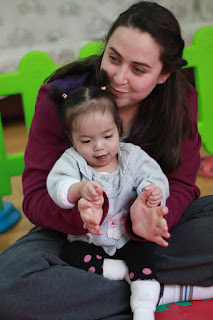We believe that children are not just passive recipients of environmental influences but are actively engaged with the environment with their own intentions and orientations, intellectual understandings, and emotions. In other words, children are active participants who contribute to their own development and understanding of the world.
From a very young age, children show great curiosity about their environment. They actively seek out new experiences and explore their surroundings by observing, touching, manipulating, and, of course, putting objects in their mouth. Above all, they are interested in the primary caregivers and then later, other adults and children in their life.
In addition, we often see children with physical disabilities demonstrate amazing adaptabilities. In spite of their physical limitations, they manage to find ways to communicate, to move around, to play, and to express themselves. Their desire to connect and communicate are made clear as they use gestures, sounds, eye contacts, etc. to engage with caregivers, peers, and toys.
In general, children actively learn through social interactions. They enjoy engaging with caregivers, peers, and others around them. Educational research show that for children, cultural norms, language, and socially acceptable behaviors are all acquired through active participation in social life.
Learning happens from children’s encounter with the social context mainly in the following three ways: First, children learn by observing and imitating what the others are doing. In our group homes, we often see older children voluntarily care for the younger siblings just as they have seen their group home parents do.
Second, children learn through trial-and-error. Rather than passively waiting for instructions, they try to make sense of the environment by testing out new possibilities and see what the consequences are. For example, a young child sitting in a highchair may throw a toy and watch how it falls (and often what a caregiver responds). The child learns about gravity (and cause-and-effect, when the adult picks up the toy every time).
Third, children learn from playing with others. This is especially true when children are involved in pretend play, where they recreate in play what they see, hear, and understand in their everyday reality.
Children do not just absorb whatever information is provided to them. Rather, they make sense of their everyday experiences based on their developmental levels and past experiences. This is why a similar situation may be interpreted and responded very differently by different children.
An important implication is that children’s active engagement with the environment requires that people who work with the children be conscious of their different needs and preferences when trying to offer support. Our role as caregivers and educators is not to decide for children every aspect of their experience, but to prepare an environment that tailors to their individual differences in order to protect their natural curiosity, intellectual growth, and emotional development.
The belief that “children are not passive recipients of environmental influences” helps us to rethink how we provide care, education, and emotional support in orphanage settings. Children are not merely shaped by their environment, but they actively reach out, interact, and make sense of the world around them with their abilities, preferences, and emotions.









































.jpg)














-X3.jpg)